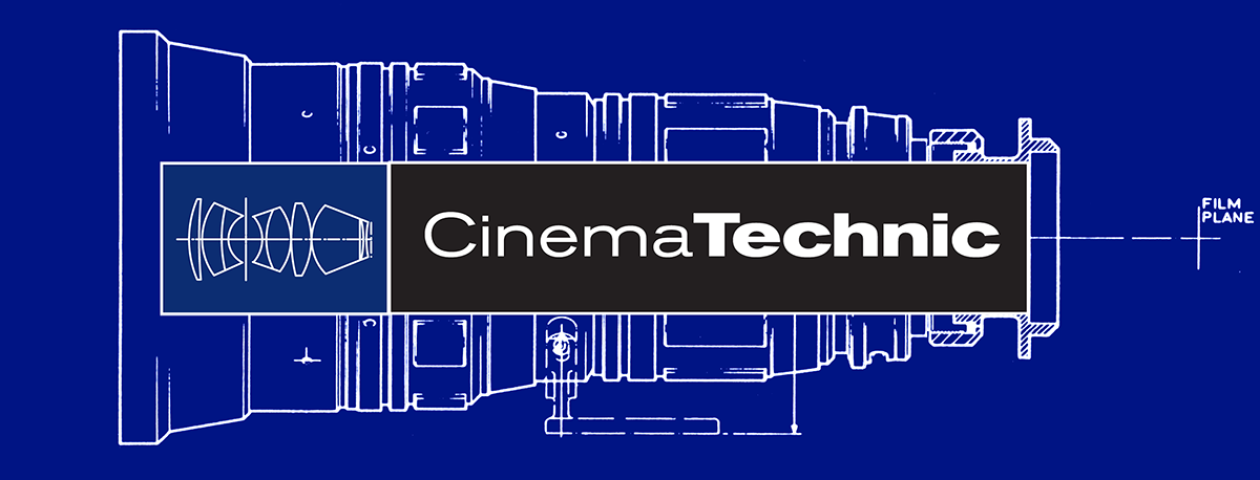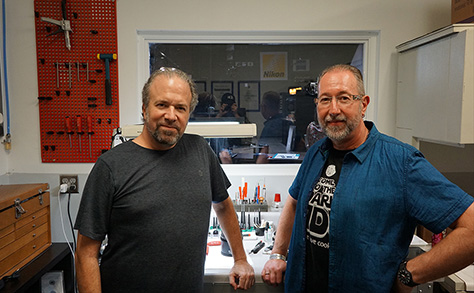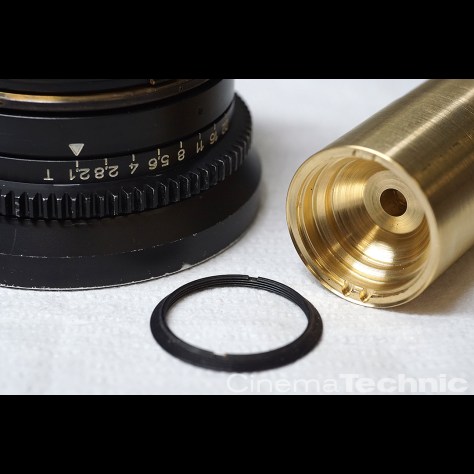Super-Precision Collimator Systems for Cine Lens Testing
Updated 4 January 2019
UPDATE: New CinemaTechnic lens testing mounts “Standards” for Richter Cine Collimators and Lens Projectors are now available. We can supply most SLR and rangefinder lens mounts such as Canon FD, Canon EF, Nikon F, Leica M and Leica R. A Sony E / NEX mount is in development.
The CinemaTechnic IMS (Interchangeable Mount System) upgrade for Richter Cine Collimators and Test Projectors is also now available.
CinemaTechnic is developing focus testing collimator systems and upgrades for existing collimator systems (Möeller-Wedel and Richter Cine).
Drawing on our two decades of experience with cine lens testing equipment, including state-of-the-art MTF testing systems by Carl Zeiss, we are bringing dependable precision lens testing and calibration within the reach of even small rental houses. Our new upgrades bring the venerable and affordable Richter Cine system into the 21st Century.

Richter Cine Collimator Systems – Reconditioned and Calibrated
We have used collimator systems available, although supply is very limited. The latest reconditioned and upgraded system is pictured above. It features the Digital Micrometer Upgrade and the LED Fiber Optic Illuminator with a proprietary Fiber Optic Adapter
The new Fiber Optic Adapter incorporates high quality diffusion, a spectral filter and condenser optics to assure even illumination of the collimator reticle. Along with the 5500ºK light from the LED Illuminator this combination greatly increases the ease of focus adjustment with the Richter Collimator, especially for vintage lenses that do not “snap” into focus as clearly as modern lenses do.

Used Reconditioned Collimator Components
We have a small stock of reconditioned and calibrated Richter Cine collimator components. These include the rare 500mm collimator objective pictured above. Please contact us via email with your requirements.
New Accessories for Richter Cine Collimators and Test Projectors

The first new product is the EF mount (Canon) lens “standard” for Richter Cine Collimators and Lens Test Projectors. EF mount is now the second most popular lens mount in professional cinematography, behind only ARRI PL mount. But an EF mount was never offered by Richter Cine.
The first new product is the EF mount (Canon) lens “standard” for Richter Cine Collimators and Lens Test Projectors. EF mount is now the second most popular lens mount in professional cinematography, behind only ARRI PL mount. But an EF mount was never offered by Richter Cine.

CinemaTechnic EF (Canon) Mount for Richter Cine
- Anodized aluminum (all surfaces), chrome plated brass lens mount flange, laser engraved
- One-pice thread and flange (no slipping/loosening, no set screws)
- EF mount can be rotated to the desired orientation in 22.5º increments by un-bolting the middle flange and turning it.
- Factory calibrated to 44.00 mm F.F.D. ± 0.01 mm
- Flange Focal Distance can be fine tuned using commonly available Zeiss shims, to compensate for wear, temperature changes, etc.
- High quality Made in USA item.
EF Mount for Richter Cine $624.-
If you need a still camera mount other than Canon EF, such as Canon FD, Contax C-Y, Nikon F, Leica M, Leica R, please contact us via email.
![]()
We recommend this type of lens mount for Richter Collimator users that have many original Richter Cine lens standards that they want to keep using, and just need to add another mount.
If you have very few or no original Richter lens mounts that you want to keep using, our IMS Conversion may be a better choice for you.


CinemaTechnic IMS Mount Adapter for Richter Cine NEW
- This unique adapter easily converts your Richter Cine M2 Focal Plane Micrometer to IMS (Interchangeable Mount System) mount.
- One-pice thread and flange (no slipping/loosening, no set screws)
- IMS flange can be rotated to preferred orientation in 22.5º increments
- Mount stays put once set. No loosening or unwanted rotation
- Makes Richter Cine Collimators mount-compatible with P+S Technik Lens Checker and Gecko-Cam Lens Test Projector
- You can calibrate your Richter Cine analog M2 micrometer zero once to IMS standard (19.00 mm) and quickly interchanging lens mounts without having to re-check and adjust zero on M2
Richter – IMS Conversion: Price TBA, Please inquire.

CinemaTechnic Digital Micrometer Upgrade for Richter M-2 Focal Plane Micrometer NEW
- Upgrades the Richter M-2 Focal Plane Micrometer with a modern Mitutoyo Digimatic micrometer
- 0.001 mm [0.00005] in accuracy (one-thousandth millimeter, fifty millionths inch)
- 25.4mm [1.0 in] range of micrometer travel
- 5mm [0.2 in] range ahead of the threaded flange, a benefit of the exclusive CinemaTechnic design
- Excellent image quality on reflex autocollimator due to super hardened lapped reflector
- Quickly set zero or pre-set to a distance (ex. 52.000 mm)
- Precision no-stress, no-damage collet clamping system for micrometer stem
- No more concern about replacing damaged Richter reflectors (unavailable for 20 years) or the high labor cost of replacement and calibration.
- Each conversion is precision fitted to the individual Richter M-2 and calibrated.
Price $1995.- including Richter M-2, Mitutoyo Digimatic micrometer and installation/calibration
Pricing for conversion of your existing M-2 unit depends on age and condition, but will be lower than the price quoted above. Please contact us via email with photos of your unit.

CinemaTechnic Digital Focal Plane Micrometer with IMS
- Super precision digital Focal Plane Micrometer with interchangeable mount plate.
- 0.001 mm / 0.00005 in accuracy (one-thousandth millimeter, fifty millionths inch)
- 50mm range of micrometer travel
- Excellent image quality on reflex autocollimator
- Quickly set zero or pre-set to a distance (ex. 52.000 mm)
- Shown in photo with Richter Standard mount plate and IMS Adapter
- Industry standard IMS adapter can be easily unthreaded for use with mounts that are too short for IMS.
- Compatible with C-mount, CS-mount, Micro Four Thirds (MFT) and Sony E mount with IMS adapter removed.
- Precision no-stress, no-damage clamping system for micrometer stem
- Available for Richter Cine, Moeller-Wedel, Chrosziel, and other autocollimator systems
Price as pictured above: $3335.- including IMS Adapter
What is IMS Interchangeable Mount System?
The IMS system was introduced by P+S Technik in the 2000’s as an open standard positive locking intermediate lens mount. It is similar dimensionally to ARRI PL mount but has a smaller pilot diameter and a much shorter flange focal distance.
The IMS system has been adopted by manufacturers of high quality cine lens test equipment, such as Gecko-Cam (collimator and test projector) and P+S Technik (Lens Checker test projector).
IMS mounts are available for a wide variety of lens mounts. CinemaTechnic can manufacture IMS compatible mounts for many cine and still camera lens mounts.
NOTE: The relatively rare Richter Cine Lens Test Projector uses the same threaded mount, but requires special clearancing (larger I.D. and shorter thread length). Lens Test Projector compatible versions of our products are available on special order and require shipping of the lens projector to us for fit testing.
We also have Sony E (NEX) mount and C/CS mounts for Richter Cine under development.
Please contact:
![]()
NOTE: Products pictured above are prototypes. The production versions will differ slightly due to ongoing incremental updates to the design.
Keep an eye on this page for updates…
Updated: 4 January 2019










